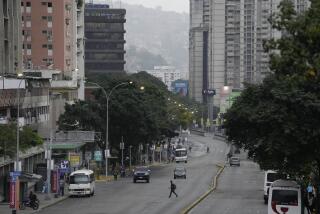Voters Are Few, Disputes Many as Mubarak Wins
- Share via
CAIRO — The ballot count in Egypt’s first contested presidential election came out as predicted: Hosni Mubarak was swept back into the job he’s held for nearly a quarter of a century.
But fewer than one in four registered voters cast a ballot, a potential blow to the ruling party, which predicted widespread participation. There also were reports of irregularities, including intimidation, at the polls.
Mubarak collected 88% of the votes cast by 23% of Egyptians registered to vote, the election commission announced Friday night on state television.
After completing an election with an all-but-foretold victor, the government will be watched closely, its moves measured against campaign promises that Egypt would evolve into a more democratic country.
U.S. officials said this week that the election represented progress and, despite imperfections, fit into the Bush administration’s goals for advancing democracy.
A senior State Department official said Friday that the election marked “a significant initial step toward fuller democracy” in Egypt. The official, who declined to be identified because she was not authorized to speak publicly, cited increased transparency and improved media access as positive developments, despite “apparent procedural irregularities” at polling stations.
Next in focus will be crucial parliamentary elections this fall, which the U.S. official said offered Cairo “an opportunity to demonstrate a real commitment to democracy by supporting a political process that enjoys the credibility and legitimacy in the eyes of the international community and the Egyptian people.”
On the campaign trail, Mubarak and his aides painted heady pictures of his next six-year term. They spoke of paring down the powers of the presidency, handing more authority to parliament and lifting long-standing emergency law. Such institutional tweaking doesn’t make for eye-grabbing banners or raucous rallies, but could fundamentally recast Egypt’s political landscape.
“This is the kind of change that cannot be reversed.... Think of the future -- not just this election, but the next election,” Prime Minister Ahmed Nazief said in an interview last week. “There will be other steps. Constitutional changes, balance of power, emergency law.”
But many analysts are skeptical of the government’s intentions and ability to cut down on Mubarak’s powers.
“I think the nature of the regime is that it’s not able to make real reform,” said Amr Shobaki, an analyst at Cairo’s Al Ahram Center for Strategic Studies. Holding the presidential election, he said, was “the maximum change” that could be expected from Mubarak.
The low voter turnout appeared to support the belief among Egyptians that the election was an effort to win foreign approval and ease domestic pressure.
“The violations and irregularities that have taken place were incredible,” said Hisham Kassem, publisher of the opposition Al Masry al Youm newspaper. “This means that we have to continue pushing. We already know that Mubarak and his regime are not committed to change.”
Independent candidates were, in effect, banned from running, and political parties will face heavy restrictions in the next presidential election. The polling was marred by complaints that members of Mubarak’s ruling party intimidated, bribed and coerced voters at the ballot box.
No foreign monitors watched the voting, despite calls from the United States.
The election, some analysts say, may have undercut U.S. efforts to convince the Arab world that Washington wants to promote democracy.
Looking on from Lebanon, columnist Satie Noureddin argued in the newspaper An Nahar that the United States had abandoned its push for democracy in the Middle East. Washington was regressing to the notion that “Arab and Islamic states need to reform and develop their security apparatuses rather than reforming their political, economic and educational institutions,” Noureddin wrote.
In November’s legislative elections, even small gains will be crucial: Under the presidential election laws, only parties that control at least 5% of the parliamentary seats will be allowed to field a candidate for president in the next election. Thus far, Mubarak’s party is the only one to qualify.
The outlawed popular Muslim Brotherhood is expected to pick up seats by running its candidates as independents.
If nothing else, the three-week presidential campaign seemed to get Egypt’s political blood stirring again.
Egyptians learned that it was possible for new opposition parties, such as Ayman Nour’s Tomorrow Party, to rise quickly. Nour came in a distant second to Mubarak in this election, capturing more than 7% of the vote.
The liberal Wafd Party used the presidential campaign to gain exposure and attract voters for the legislative elections, its spokesman said.
“If we don’t participate in this election, it will be very difficult to have serious candidates in the parliamentary elections,” Mahmoud Abaza said.
“The timetable makes the two elections, in fact, one election.”
Kifaya, or Enough, the anti-Mubarak street protest organization that has stirred dissent against the longtime president, will reassess its tactics.
“We have to think about what kinds of targets and methods we have,” said Wael Khalil, a 40-year-old software engineer and Kifaya organizer.
“The most difficult problem is that people feel like they can’t do anything. It’s not apathy, it’s despair,” he said. “We have to start really talking about the difficulties of life under Mubarak. The disregard for human life, the police brutality, the unemployment.”
Jailan Zayan of The Times’ Cairo Bureau and Times staff writers Paul Richter and Tyler Marshall in Washington contributed to this report.
More to Read
Sign up for Essential California
The most important California stories and recommendations in your inbox every morning.
You may occasionally receive promotional content from the Los Angeles Times.













